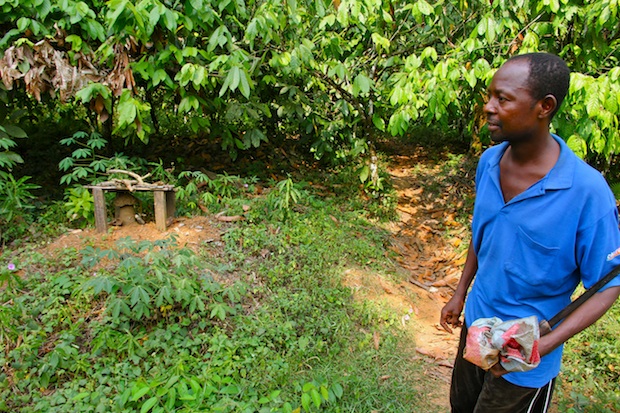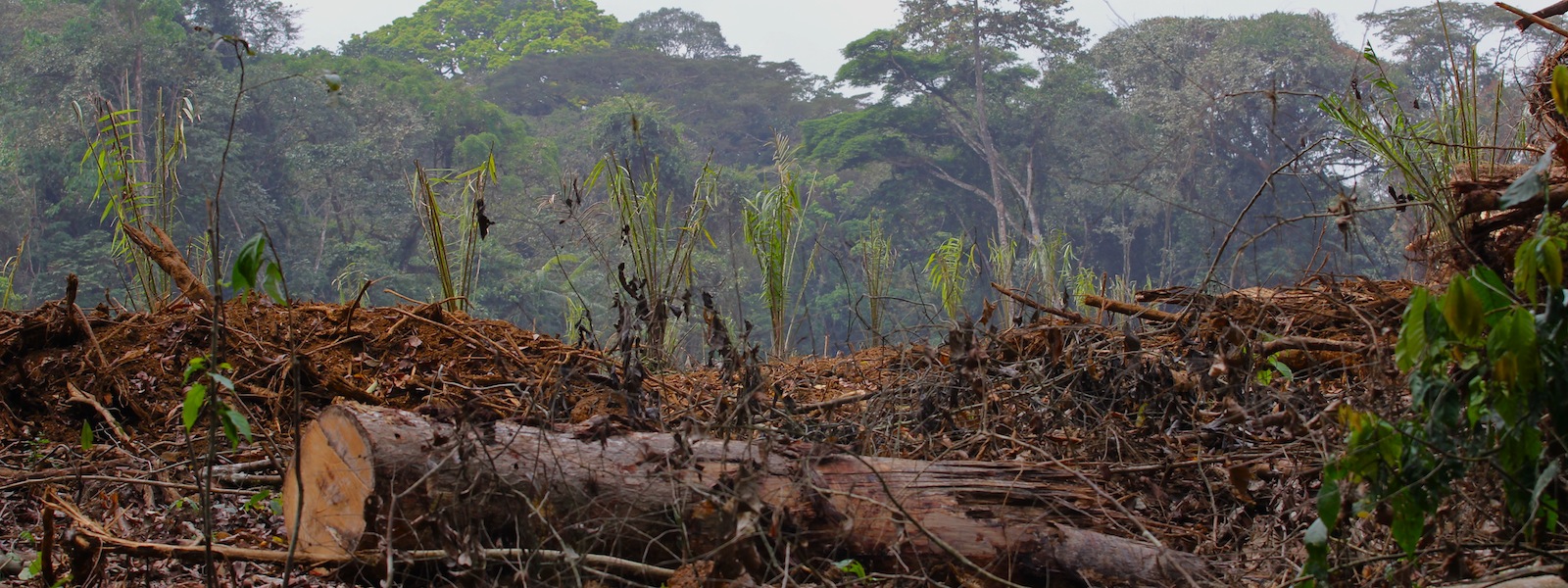
Entrance to cocoa farm in forest, Southwest Region, Cameroon. This land is earmarked for the Herakles Farms plantation.
This article is reprinted from the Spring 2013 issue of the PHP Post, a publication of the Presbyterian Hunger Program
By Jaff Bamenjo, RELUFA, JH Cameroon and Nasako Besingi, Director, Struggle to Economize Future Environment in Cameroon (SEFE)
Herakles Farms is a New York based company which obtained 73.086 hectares (172,912 acres or 270 square miles) of land through its Cameroonian subsidiary SGSOC in some villages in the Ndian and Kupe Maneguba divisions of the South West region of Cameroon for an oil palm plantation project. The case of Herakles Farms is one of RELUFA’s (PHP’s Joining Hands Cameroonian partner) campaign foci within its Land and Food justice platform.
Large-scale land acquisition in Africa by foreign agriculture multinational companies is on the rise. This phenomenon represents a huge cost to local farmers as it takes away from them the land, which is their most important wealth.
Herakles Farms and five other multinational companies are currently applying for a total of almost 1-million hectares of land for industrial palm oil production in Cameroon despite the fact that there are already five industrial palm oil producing companies in the country. But these industrial palm oil companies provide only about 30 percent of the local market with palm oil and the rest coming from smallholder producers.
Small holders can produce enough palm oil, which is used for cooking as well as soaps and lotions, to supply the local and international market if there is adequate government support. Industrial palm oil plantations are problematic because they take away agricultural land from the local population in a context where food security is already a concern. The 2008 hunger strike that affected many parts of Cameroon is one clear indication of the precarious food security situation in the country.
Farmers in villages where Herakles Farms projects are planned have a firm belief that the land earmarked for lease to Herakles belongs to them. Their perception is that their ownership of the land they have occupied for time immemorial is unshaken, considering that the preamble to the Land and Native Rights Ordinance of West Cameroon recognizes customary land ownership. But the 1974 Cameroon land law (enacted after the unification of the French and English parts of the country) only recognizes ownership when land is legally registered and titled, which is hardly the case in most rural communities.
A lot of momentum is being generated by national and international partners against the Herakles Farms oil palm project in Cameroon. The campaign, as a matter of principle, constitutes an effort to preserve human dignity by averting starvation or malnourishment of people living in the project area. This message must be spread far and wide.
Some villages like Fabe, Masaka, Mbimaand Mundemba, have sent letters to local administrative authorities protesting against this project. Concrete scenarios feared by the population of the project zone are that they will lose land for cultivating their staple foods like cassava and cash crops like cocoa, and that they will lose forest area for harvesting non timber forest products like spices, njansa, bush mango, bitter kola, and medicinal herbs.
Becoming laborers for a multinational company gives them no time to work on their own farms to provide for their families. At the same time, the plantation may lead to the emergence of a local market economy with higher food and oil palm prices, disrupting the independent subsistence way of life villagers have known for ages.
As Nasako Besingi, a farmer and civil society activist at the forefront of the campaign against the Herakles Farms project in Cameroon, declared in his award ceremony speech in December of 2012, “We have to work to put an end to this type of project in order to prevent a looming crisis.”

The Herakles Farm Project in Cameroon is a stand project for employment opportunities but what is the reaction of the local population to this? are they in accordance, if not, for what reason?